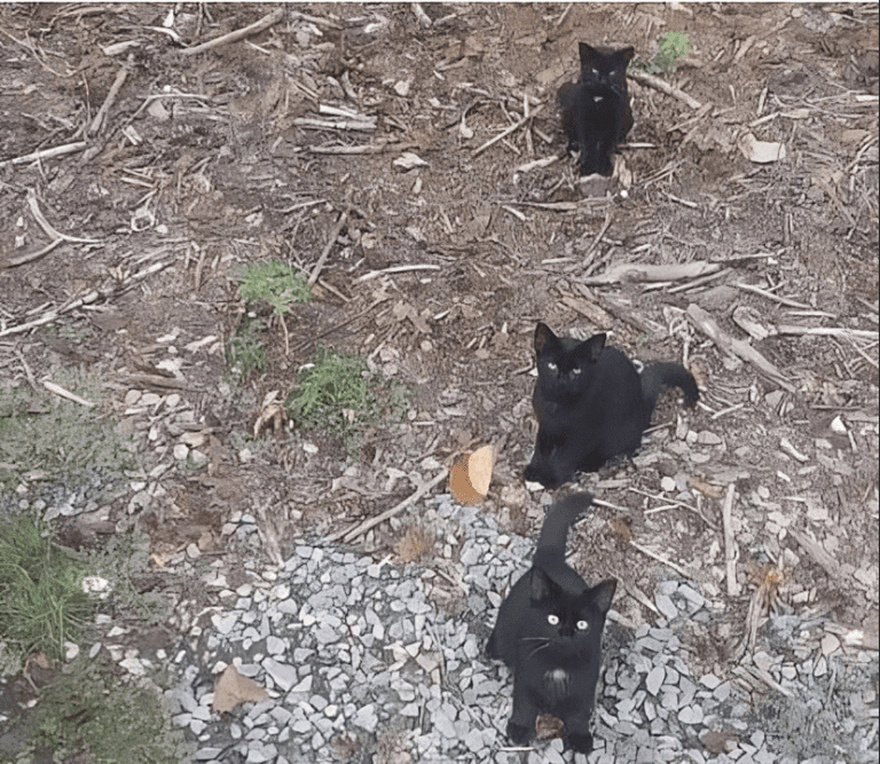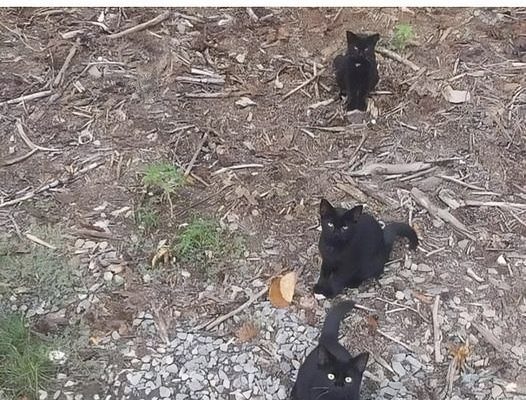If you love testing your perception with tricky puzzles, optical illusions are the perfect way to challenge your mind. From simple puzzles to complex illusions, the internet is full of images that defy your senses and push your mind to uncover hidden secrets.
If you love testing your perception with tricky puzzles, optical illusions are the perfect way to challenge your mind. From simple puzzles to complex illusions, the internet is full of images that defy your senses and push your mind to uncover hidden secrets. In this particular optical illusion, three cats are clearly visible, but the challenge is to find the elusive fourth cat. Do you think you’re up for the task?
The image was shared by the Instagram account “sarcastic_us,” with a simple yet tempting caption: “Did you find all of them?” While three black cats stare right at the camera, the fourth cat has concealed itself cleverly within the image. Finding it is not as straightforward as it seems.
The Challenge: Find the Fourth Cat

At first glance, this image seems simple enough—three cats sit together, drawing your eyes in immediately. But hidden in this scene is a fourth cat, camouflaged to make this optical illusion a true test of your observational skills. Regular fans of optical illusions, and especially those familiar with the ways cats blend into their environments, might know exactly where to look. But here’s a hint: don’t limit your search to where you see the three cats. The hidden cat is playing an impressive game of camouflage, which makes this challenge especially tricky.
Strategies for Spotting Hidden Objects in Optical Illusions
When it comes to spotting hidden elements in optical illusions, a few strategies can make all the difference. Here are some tips to help you on your search for the fourth cat:
Examine the Terrain: Think about how a cat’s fur can blend into shadows, textures, or patterns. In this case, the fourth cat might be blending in with the terrain or hiding behind an object.
Focus on Shadows and Outlines: The fourth cat might not stand out right away but look for faint outlines or shadows that don’t quite match the surroundings. Subtle differences in shade or texture can reveal hidden shapes.
Scan the Corners: Hidden objects in illusions are often positioned away from the center to draw attention to other areas. Try focusing on the edges of the image to uncover overlooked details.
Let Your Eyes Wander: Sometimes, stepping back from the image and viewing it from different angles can make hidden details “pop” out. Your eyes might catch the hidden cat when you’re not focused directly on it.
A Closer Look: Camouflage and the Art of Illusion
Optical illusions like this cat puzzle show us how well creatures—especially animals—can blend into their environments. The fourth cat in this illusion likely uses its natural coloring to its advantage, creating an illusion of “disappearing” into the background. Cats, known for their excellent camouflage, often use shadows and textures to blend in, making it hard for predators or prey to spot them.
Our brains are wired to spot familiar patterns quickly, which is why the three obvious cats are easy to see. But when it comes to objects that don’t fit our usual expectations, like the hidden cat here, our minds may skip over them entirely. This illusion reminds us of the remarkable ways our brains work, sometimes making assumptions and filling in blanks that aren’t actually there.
Did You Find the Fourth Cat? Here’s the Answer
If you’ve taken your time to scan the image and still haven’t found the fourth cat, don’t worry—you’re not alone. Optical illusions are designed to stump even the sharpest of minds. The fourth cat in this image is cleverly camouflaged on the left side, blending in with the background. Its outline and slight shadow make it hard to spot, and without a second look, it’s easy to miss entirely.
Upon closer examination, the fourth cat’s body becomes visible as a faint outline that merges with the terrain, a trick that takes advantage of both the environment and our tendency to focus on the more obvious figures in the center. This reveal showcases how easily our eyes and minds can be deceived, especially when something hides in plain sight.
Why Optical Illusions Fascinate Us
So, why are optical illusions like this cat puzzle so captivating? It’s because they do more than entertain—they challenge the way we see the world and how we process information. They teach us that perception isn’t always reality. Our brains are incredibly skilled at spotting patterns, but they also make assumptions that can lead us astray. Optical illusions remind us that we don’t always see things as they truly are, and they offer a playful way to exercise our minds.
Illusions like this one also reveal something fascinating about how animals, including humans, interact with their environments. Camouflage is a survival tool in the animal kingdom, with creatures using patterns and colors to hide from predators or sneak up on prey. This optical illusion taps into those same skills, asking us to search for the hidden in a way that’s both challenging and satisfying.
The Satisfaction of Solving an Optical Illusion
If you managed to find the fourth cat on your own, congratulations! That moment when the hidden cat comes into view brings a unique sense of accomplishment and a rush of excitement. It’s a little like being let in on a secret that only a few people know. Optical illusions reward patience, observation, and perseverance, and finding the solution is immensely satisfying.
If you didn’t spot the cat right away, don’t be discouraged. Optical illusions are designed to be difficult, and sometimes it takes a few tries to spot the hidden details. Even without finding the answer immediately, you’ve still sharpened your observational skills and given your mind a workout.
Conclusion: The Hidden Wonders of Optical Illusions
Optical illusions like the hidden fourth cat in this image aren’t just fun challenges; they remind us of the complexities of perception and the way our brains interpret the world. These puzzles ask us to look beyond the obvious, teaching us to see things from a new perspective. By searching for the hidden, we’re exercising our minds, testing our patience, and finding satisfaction in discovery.
So, next time you’re faced with an optical illusion, take a moment to slow down and observe. Let your eyes wander, allow your mind to open to the possibility of hidden details, and enjoy the journey. Because in the world of optical illusions, the journey of discovery is just as rewarding as finding the answer itself.



